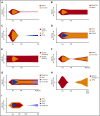Clonal hematopoiesis and measurable residual disease assessment in acute myeloid leukemia
- PMID: 32232484
- PMCID: PMC7225688
- DOI: 10.1182/blood.2019004770
Clonal hematopoiesis and measurable residual disease assessment in acute myeloid leukemia
Abstract
Current objectives regarding treatment of acute myeloid leukemia (AML) include achieving complete remission (CR) by clinicopathological criteria followed by interrogation for the presence of minimal/measurable residual disease (MRD) by molecular genetic and/or flow cytometric techniques. Although advances in molecular genetic technologies have enabled highly sensitive detection of AML-associated mutations and translocations, determination of MRD is complicated by the fact that many treated patients have persistent clonal hematopoiesis (CH) that may not reflect residual AML. CH detected in AML patients in CR includes true residual or early recurrent AML, myelodysplastic syndrome or CH that is ancestral to the AML, and independent or newly emerging clones of uncertain leukemogenic potential. Although the presence of AML-related mutations has been shown to be a harbinger of relapse in multiple studies, the significance of other types of CH is less well understood. In patients who undergo allogeneic hematopoietic cell transplantation (HCT), post-HCT clones can be donor-derived and in some cases engender a new myeloid neoplasm that is clonally unrelated to the recipient's original AML. In this article, we discuss the spectrum of CH that can be detected in treated AML patients, propose terminology to standardize nomenclature in this setting, and review clinical data and areas of uncertainty among the various types of posttreatment hematopoietic clones.
© 2020 by The American Society of Hematology.
Conflict of interest statement
Conflict-of-interest disclosure: B.L.E. has received research funding from Celgene and Deerfield; has received consulting fees from GRAIL; and serves on the scientific advisory boards for, and holds equity in, Skyhawk Therapeutics and Exo Therapeutics. T.G. has received research funding from Janssen and Calico. The remaining authors declare no competing financial interests.
Figures

References
-
- Cargo CA, Rowbotham N, Evans PA, et al. . Targeted sequencing identifies patients with preclinical MDS at high risk of disease progression. Blood. 2015;126(21):2362-2365. - PubMed
Publication types
MeSH terms
Grants and funding
LinkOut - more resources
Full Text Sources
Medical

